Ode to Cosmos
international release: 5th November 2020
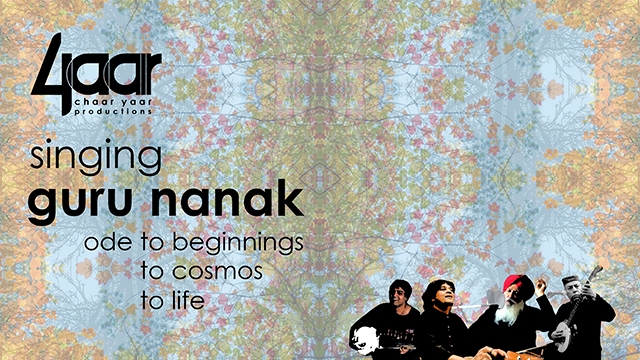
Chaar Yaar and the Hymns Project
Long years ago, in mid-90s, when we started performing in public, there were four of us who, to our infinite joy, came from four different religious (possibly even non-religious) backgrounds.
The group continued to exist without a name for almost a decade when finally as an act of faith, we decided to give ourselves a name and began to be called Chaar Yaar quietly affirming the
essential and defining core of who we always had been – a plural cultural fabric that had been inclusive against, at times, heavy odds . Thus, we, of four different religious background, four different ethnicities and languages alighted with inherent faith and goodwill in the global but clearly rooted celebration of melody and through that upholding a bond of human dignity.
We began with a large repertoire of Sufi texts but soon discovered that those texts were in a state of continuous dialogue with other texts that spoke to them from beyond the hazy boundaries of one’s limited existence. Our repertoire thus soon grew and engaged in exciting melodic exploration of the Bhakti and, in a limited sense, Gurbani texts to begin with.
The vista soon grew to accommodate literary texts which we had been exposed to as students of western and Indian literatures. The songs were beginning to get enmeshed and the texts became increasingly assimilated or embedded with single compositions. Things couldn’t have been more enjoyable than going from Rumi to Kabir to Nanak to John Lennon to Bulleh Shah. This was also the time when as a group we were getting invited to major national and international travels and the four of us were in a mode of perpetual journey – both physically and creatively.
The very idea of cultural and philosophical exchange drew us closer to the quintessential journey man and a poet of intrepid exploration of the self and the life outside that extended well-beyond the planet – Guru Nanak. His inclusive vision that fearlessly challenged the
obfuscating social conventions, that unleashed a spirit of ceaseless wonderment at the spectacle of creation, that conceived his journeys as pilgrimages without defined destinations, that abounded in his love for ecology were the things that struck us all very deeply. We four decided to sist down finally in the 550 th year of his birth and create our humble tribute by rendering his Odes to Cosmos, to Wonderment and to Life.
2019 proved to be an unusually productive year in this regard. The first part of our
engagement with Guru Nanak’s poetry took us to Los Angeles where the four of us worked with a highly talented sound engineer, Ishaan Kashyap, over several days in his parents’ villa. This resulted in an astounding body of work. Two of the tracks we recorded with him – almost 23 minute-long – are included in the album awaiting worldwide release on 5th November.
The second leg of our creative engagement took us to Vancouver on the initiative of Prof Anne Murphy of the University of British Columbia and Ruby Singh – an amazing sound designer and musician whom we were introduced to by Sirish Rao who runs the Indian Summer Festival in Vancouver. We recorded with him in a state of the art studio and subsequently performed with him to a sold-out show in the HR MacMillan Space Center of Vancouver. This album has about thirty minute of music we immensely enjoyed recording there. It may be mentioned that all these recordings are single-take recordings and retain the performative energy of a live
performance.
The Hymns
Translations by Madan Gopal Singh
Aarti
In the salver of sky,
the sun and moon have lit up as lamps
and the milky way spread out as beads of pearls
Fragrant is the wind blowing from the south
The forests and the flowers sway in reverence
How wondrous is this Hymn offered to you,
The Spirit that destroys fear,
The Spirit becoming, dissolving, becoming yet again
How enchanting the resonance in your vaults of the unstruck sound
Countless your eyes, yet none is yours
Countless your forms, formless your lure
Countless your fragrant feet, not a foot is yours
Countless your redolence, that drives me for sure
The Flame aglow in all, is you, your flame
Imbued with its shine, illumined we became
Your story emerges as Light, a revelation
That which touches you is the hymn, the oblation
Pining day and night
for the Lotus feet of the Sweet Lord,
is all the thirst I have
Bless me, says Nanak, with the water of your grace
so that I may dwell in the ocean of your Name
आरती
गगन मै थालु रवि चंदु दीपक बने तारिका मंडल जनक मोती ॥
धूपु मलआनलो पवणु चवरो करे सगल बनराइ फूलंत जोती ॥१॥
कैसी आरती होइ ॥
भव खंडना तेरी आरती ॥
अनहता सबद वाजंत भेरी ॥१॥
सहस तव नैन नन नैन हहि तोहि कउ सहस मूरति नना एक तोही ॥
सहस पद बिमल नन एक पद गंध बिनु सहस तव गंध इव चलत मोही ॥२॥
सभ महि जोति जोति है सोइ ॥
तिस दै चानणि सभ महि चानणु होइ ॥
गुर साखी जोति परगटु होइ ॥
जो तिसु भावै सु आरती होइ ॥३॥
हरि चरण कवल मकरंद लोभित मनो अनदिनो मोहि आही पिआसा ॥क्रिपा जलु देहि नानक सारिंग कउ होइ जा ते तेरै नाइ वासा ॥४॥३॥
ਆਰਤੀ
ਗਗਨ ਮੈ ਥਾਲੁ ਰਵਿ ਚੰਦੁ ਦੀਪਕ ਬਨੇ ਤਾਰਿਕਾ ਮੰਡਲ ਜਨਕ ਮੋਤੀ ॥
ਧੂਪੁ ਮਨਆਨਲੋ ਪਵਣੁ ਚਵਰੋ ਕਰੇ ਸਗਲ ਬਨਰਾਇ ਫੂਲੰਤ ਜੋਤੀ ॥1॥
ਕੈਸੀ ਆਰਤੀ ਹੋਇ ॥
ਭਵ ਖੰਡਨਾ ਤੇਰੀ ਆਰਤੀ ॥
ਅਨਹਤਾ ਸਬਦ ਵਾਜੰਤ ਭੇਰੀ ॥1॥
ਰਹਾਉ॥
ਸਹਸ ਤਵ ਨੈਨ ਨਨ ਨੈਨ ਹਹਿ ਤੋਹਿ ਕਉ ਸਹਸ ਮੂਰਤਿ ਨਨਾ ਏਕ ਤੁਹੀ ॥
ਸਹਸ ਪਦ ਬਿਮਲ ਨਨ ਏਕ ਪਦ ਗੰਧ ਬਿਨੁ ਸਹਸ ਤਵ ਗੰਧ ਇਵ ਚਲਤ ਮੋਹੀ ॥2॥
ਸਭ ਮਹਿ ਜੋਤਿ ਜੋਤਿ ਹੈ ਸੋਇ ॥
ਤਿਸਦੈ ਚਾਨਣਿ ਸਭ ਮਹਿ ਚਾਨਣੁ ਹੋਇ ॥
ਗੁਰ ਸਾਖੀ ਜੋਤਿ ਪਰਗਟੁ ਹੋਇ ॥
ਜੋ ਤਿਸੁ ਭਾਵੈ ਸੁ ਆਰਤੀ ਹੋਇ ॥3॥
ਹਰਿ ਚਰਣ ਕਵਲ ਮਕਰੰਦ ਲੋਭਿਤ ਮਨੋ ਅਨਦਿਨੋ ਮੋਹਿ ਆਹੀ ਪਿਆਸਾ ॥
ਕ੍ਰਿਪਾ ਜਲੁ ਦੇਹਿ ਨਾਨਕ ਸਾਰਿੰਗ ਕਉ ਹੋਇ ਜਾ ਤੇ ਤੇਰੈ ਨਾਇ ਵਾਸਾ ॥4॥3॥(13)॥
آرتی
گگن مے تھالُ روِ چندُ دیپک بنے تارکا منڈل جنک
موتی ۔۔
دھوپُ منانلو پونُ چورو کرے سگل بنرائِ پھولنت جوتی ۔۔1۔۔
کیسی آرتی ہوئِ ۔۔
بھوَ کھنڈنا تیری آرتی ۔۔
انہتا سبد واجنت بھیری ۔۔1۔۔رہاؤ۔۔
سہس تو نین نن نین ہہہ توہِ کؤ سہس مورتِ ننا ایک تہی ۔۔
سہس پد بمل نن ایک پد گندھ بنُ سہس تو گندھ اوَ چلت موہی ۔۔2۔۔
سبھ مہہ جوتِ جوتِ ہے سوئِ ۔۔
تسدے چاننِ سبھ مہہ چاننُ ہوئِ ۔۔
گر ساکھی جوتِ پرگٹُ ہوئِ ۔۔
جو تسُ بھاوے سو آرتی ہوئِ ۔۔3۔۔
ہرِ چرن کول مکرند لوبھت منو اندنو موہِ آہی پیاسا ۔۔
کرپا جلُ دیہہ نانک سارنگ کؤ ہوئِ جا تے تیرے نائ واسا ۔۔4۔۔3۔۔(13)۔۔
Vismaad Naad
Wondrous is the resonance
wondrous the knowledge that happens
wondrous is the living
wondrous the difference in which it swings
wondrous the multiple forms
wondrous their colors in which they abound
wondrous the naked that move around
wondrous the wind wondrous the water
wondrous the fire the frolicking paradox
wondrous the earth, wondrous its beginning, wondrous its source, wondrous its origins wondrous is the taste
that all mortals overtakes
wondrous the union wondrous separation
wondrous the hunger wondrous oblations wondrous profusion
wondrous the praise wondrous applause
wondrous the wilderness wondrous the path
wondrous the near wondrous afar
wondrous the Presence permeating all
the sense of wonder beholds the paradox
says Nanak a destiny that is full holds it all.
विसमादु नाद
विसमादु नाद विसमादु वेद ॥
विसमादु जीअ विसमादु भेद ॥
विसमादु रूप विसमादु रंग ॥
विसमादु नागे फिरहि जंत ॥
विसमादु पउणु विसमादु पाणी ॥
विसमादु अगनी खेडहि विडाणी ॥
विसमादु धरती विसमादु खाणी ॥
विसमादु सादि लगहि पराणी ॥
विसमादु संजोगु विसमादु विजोगु ॥
विसमादु भुख विसमादु भोगु ॥
विसमादु सिफति विसमादु सालाह ॥
विसमादु उझड़ विसमादु राह ॥
विसमादु नेड़ै विसमादु दूरि ॥
विसमादु देखै हाजरा हजूरि ॥
वेखि विडाणु रहिआ विसमादु ॥
नानक बुझणु पूरै भागि ॥१॥(463)॥
ਵਿਸਮਾਦੁ ਨਾਦ
ਵਿਸਮਾਦੁ ਨਾਦ ਵਿਸਮਾਦੁ ਵੇਦ ॥
ਵਿਸਮਾਦੁ ਜੀਅ ਵਿਸਮਾਦੁ ਭੇਦ ॥
ਵਿਸਮਾਦੁ ਰੂਪ ਵਿਸਮਾਦੁ ਰੰਗ ॥
ਵਿਸਮਾਦੁ ਨਾਗੇ ਫਿਰਹਿ ਜੰਤ ॥
ਵਿਸਮਾਦੁ ਪਉਣੁ ਵਿਸਮਾਦੁ ਪਾਣੀ ॥
ਵਿਸਮਾਦੁ ਅਗਨੀ ਖੇਡਹਿ ਵਿਡਾਣੀ ॥
ਵਿਸਮਾਦੁ ਧਰਤੀ ਵਿਸਮਾਦੁ ਖਾਣੀ ॥
ਵਿਸਮਾਦੁ ਸਾਦਿ ਲਗਹਿ ਪ੍ਰਾਣੀ ॥
ਵਿਸਮਾਦੁ ਸੰਜੋਗੁ ਵਿਸਮਾਦੁ ਵਿਜੋਗੁ ॥
ਵਿਸਮਾਦੁ ਭੁਖ ਵਿਸਮਾਦੁ ਭੋਗੁ ॥
ਵਿਸਮਾਦੁ ਸਿਫਤਿ ਵਿਸਮਾਦੁ ਸਾਲਾਹ ॥
ਵਿਸਮਾਦੁ ਉਝੜ ਵਿਸਮਾਦੁ ਰਾਹ ॥
ਵਿਸਮਾਦੁ ਨੇੜੈ ਵਿਸਮਾਦੁ ਦੂਰਿ ॥
ਵਿਸਮਾਦੁ ਦੇਖੈ ਹਾਜਰਾ ਹਜੂਰਿ ॥
ਵੇਖਿ ਵਿਡਾਣੁ ਰਹਿਆ ਵਿਸਮਾਦੁ ॥
ਨਾਨਕ ਬੁਝਣੁ ਪੂਰੈ ਭਾਗਿ ॥1॥(463)॥
وسمادُ ناد
وسمادُ ناد وسمادُ وید ۔۔
وسمادُ جی وسمادُ بھید ۔۔
وسمادُ روپ وسمادُ رنگ ۔۔
وسمادُ ناغے پھرہِ جنت ۔۔
وسمادُ پؤنُ وسمادُ پانی ۔۔
وسمادُ اگنی کھیڈہِ وڈانی ۔۔
وسمادُ دھرتی وسمادُ کھانی ۔۔
وسمادُ سادِ لگہِ پرانی ۔۔
وسمادُ سنجوگُ وسمادُ وجوگُ ۔۔
وسمادُ بھکھ وسمادُ بھوگُ ۔۔
وسمادُ صفتِ وسمادُ صالاح ۔۔
وسمادُ اجھڑ وسمادُ راہ ۔۔
وسمادُ نیڑے وسمادُ دورِ ۔۔
وسمادُ دیکھے حاجرا حضورِ ۔۔
ویکھ وڈانُ رہیا وسمادُ ۔۔
نانک بجھنُ پورے بھاگِ ۔۔1۔۔(463
Arbad Narbad
When Time didn’t exist, when endless darkness prevailed
When there was no Earth no Sky; only a Command without the other shore
When day and night didn’t exist nor sun and moon, when Someone sat in a Samaadhi beyond senses
When there was no air no water; When there was no Source no Utterance
When there were no cycles of production and consumption; when there were no arrivals no departures
There was no piece of land afloat in the seven seas yet nowhere in sight; nor were the rivers flowing with gurgling waters
When there was no upper or underworld
When there was no heaven no hell; nor the all devouring Time
No heaven and hell, no birth and death; no revisits no partings
There was no Brahma, Vishnu or Mahesh
No one other than the One was visible
When there was no man no woman; no birth no caste; no pain no pleasure
अरबद नरबद
अरबद नरबद धुंधूकारा ॥
धरणि न गगना हुकमु अपारा ॥
ना दिनु रैनि न चंदु न सूरजु सुंन समाधि लगाइदा ॥१॥
खाणी न बाणी पउण न पाणी ॥
ओपति खपति न आवण जाणी ॥
खंड पताल सपत नही सागर नदी न नीरु वहाइदा ॥२॥
ना तदि सुरगु मछु पइआला ॥
दोजकु भिसतु नही खै काला ॥
नरकु सुरगु नही जमणु मरणा ना को आइ न जाइदा ॥३॥
ब्रहमा बिसनु महेसु न कोई ॥
अवरु न दीसै एको सोई ॥
नारि पुरखु नही जाति न जनमा ना को दुखु सुखु पाइदा ॥४॥
ना तदि जती सती बनवासी ॥
ना तदि सिध साधिक सुखवासी ॥
जोगी जंगम भेखु न कोई ना को नाथु कहाइदा ॥५॥
जप तप संजम ना ब्रत पूजा ॥
ना को आखि वखाणै दूजा ॥
आपे आपि उपाइ विगसै आपे कीमति पाइदा ॥६॥
ਅਰਬਦ ਨਰਬਦ
ਅਰਬਦ ਨਰਬਦ ਧੁੰਧੂਕਾਰਾ ॥
ਧਰਣਿ ਨ ਗਗਨਾ ਹੁਕਮੁ ਅਪਾਰਾ ॥
ਨਾ ਦਿਨੁ ਰੈਨਿ ਨ ਚੰਦੁ ਨ ਸੂਰਜੁ ਸੁੰਨ ਸਮਾਧਿ ਲਗਾਇਦਾ ॥1॥
ਖਾਣੀ ਨ ਬਾਣੀ ਪਉਣ ਨ ਪਾਣੀ ॥
ਓਪਤਿ ਖਪਤਿ ਨ ਆਵਣ ਜਾਣੀ ॥
ਖੰਡ ਪਤਾਲ ਸਪਤ ਨਹੀ ਸਾਗਰ ਨਦੀ ਨ ਨੀਰੁ ਵਹਾਇਦਾ ॥2॥
ਨਾ ਤਦਿ ਸੁਰਗੁ ਮਛੁ ਪਇਆਲਾ ॥
ਦੋਜਕੁ ਭਿਸਤੁ ਨਹੀ ਖੈ ਕਾਲਾ ॥
ਨਰਕੁ ਸੁਰਗੁ ਨਹੀ ਜੰਮਣੁ ਮਰਣਾ ਨਾ ਕੋ ਆਇ ਨ ਜਾਇਦਾ ॥3॥
ਬ੍ਰਹਮਾ ਬਿਸਨੁ ਮਹੇਸੁ ਨ ਕੋਈ ॥
ਅਵਰੁ ਨ ਦੀਸੈ ਏਕੋ ਸੋਈ ॥
ਨਾਰਿ ਪੁਰਖੁ ਨਹੀ ਜਾਤਿ ਨ ਜਨਮਾ ਨਾ ਕੋ ਦੁਖੁ ਸੁਖੁ ਪਾਇਦਾ ॥4॥
ਨਾ ਤਦਿ ਜਤੀ ਸਤੀ ਬਨਵਾਸੀ ॥
ਨਾ ਤਦਿ ਸਿਧਿ ਸਾਧਿਕ ਸੁਖਵਾਸੀ ॥
ਜੋਗੀ ਜੰਗਮ ਭੇਖੁ ਨ ਕੋਈ ਨਾ ਕੋ ਨਾਥੁ ਕਹਾਇਦਾ ॥5॥ਜਪ ਤਪ ਸੰਜਮ ਨਾ ਬ੍ਰਤ ਪੂਜਾ ॥
ਨਾ ਕੋ ਆਖਿ ਵਖਾਣੈ ਦੂਜਾ ॥
ਆਪੇ ਆਪਿ ਉਪਾਇ ਵਿਗਸੈ ਆਪੇ ਕੀਮਤਿ ਪਾਇਦਾ ॥6॥
اربد نربد
اربد نربد دھندھوکارا ۔۔
دھرنِ ن گگنا حکمُ اپارا ۔۔
نہ دنُ رینِ ن چندُ ن سورجُ سنّ سمادھ لگائدا ۔۔1۔۔
کھانی ن بانی پؤن ن پانی ۔۔
اوپتِ کھپتِ ن آون جانی ۔۔
کھنڈ پتال سپت نہی ساگر ندی ن نیرُ وہائدا ۔۔2۔۔
نہ تدِ سرگُ مچھ پیالا ۔۔
دوجکُ بھستُ نہی کھے کالا ۔۔
نرکُ سرگُ نہی جمن مرنا نہ کو آئِ ن جائدا ۔۔3۔۔
برہما بسنُ مہیسُ ن کوئی ۔۔
اورُ ن دیسے ایکو سوئی ۔۔
نارِ پرکھ نہی جاتِ ن جنما نہ کو دکھ سکھ پائدا ۔۔4۔۔
نہ تدِ جتی ستی بنواسی ۔۔
نہ تدِ سدھِ سادھک سکھواسی ۔۔
جوگی جنگم بھیکھُ ن کوئی نہ کو ناتھُ کہائدا ۔۔5۔۔
جپ تپ سنجم نہ برت پوجا ۔۔
نہ کو آکھِ وکھانے دوجا ۔۔
آپے آپِ اپائِ وگسے آپے قیمتِ پائدا ۔۔6۔۔
the individual within the collaboration
In anticipation of Chaar Yaar’ next international release, Siddharth Singh engaged online with the four members of the Faqiri Quartet – both individually & together – between 16th & 18th October, to know about their processes, emotions & associations in relation to the unique music that the ensemble creates.
The conversations touch upon diverse dimensions of the four members’ upbringing, relation to music & the ensemble, the madness & the methods of the group, the space for the individual within the collaboration, emotive dimensions of their creativity and many fascinating stories from their journeys together.
The varied organic exchanges with the group and its members offers insights into their diverse personal cultures & aspirations, their individual identities and contributions to the unique music and the transcendental nature of the musical language. The conversation is presented here in five episodes.
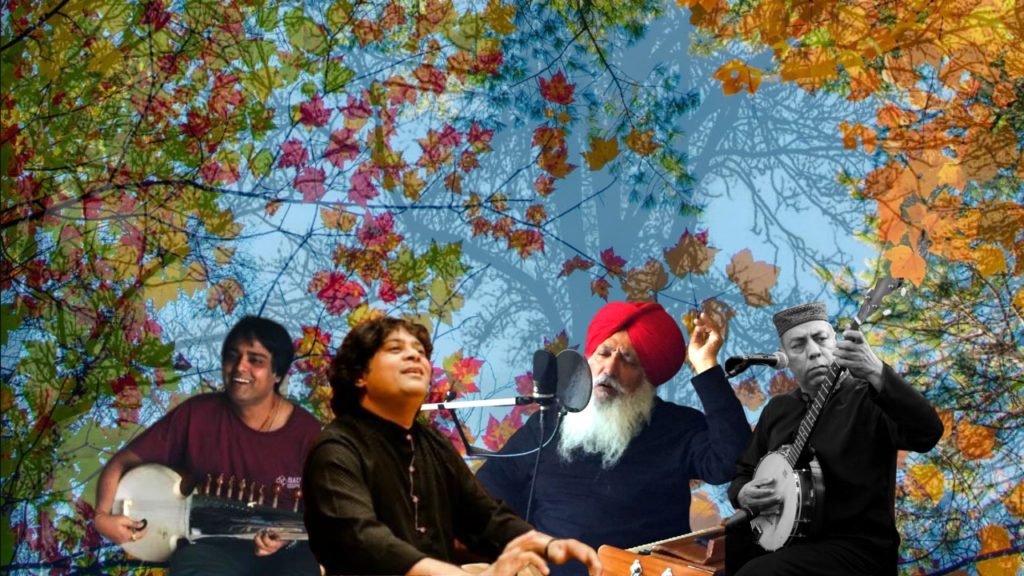
Chaar Yaar, the Faqiri Quartet
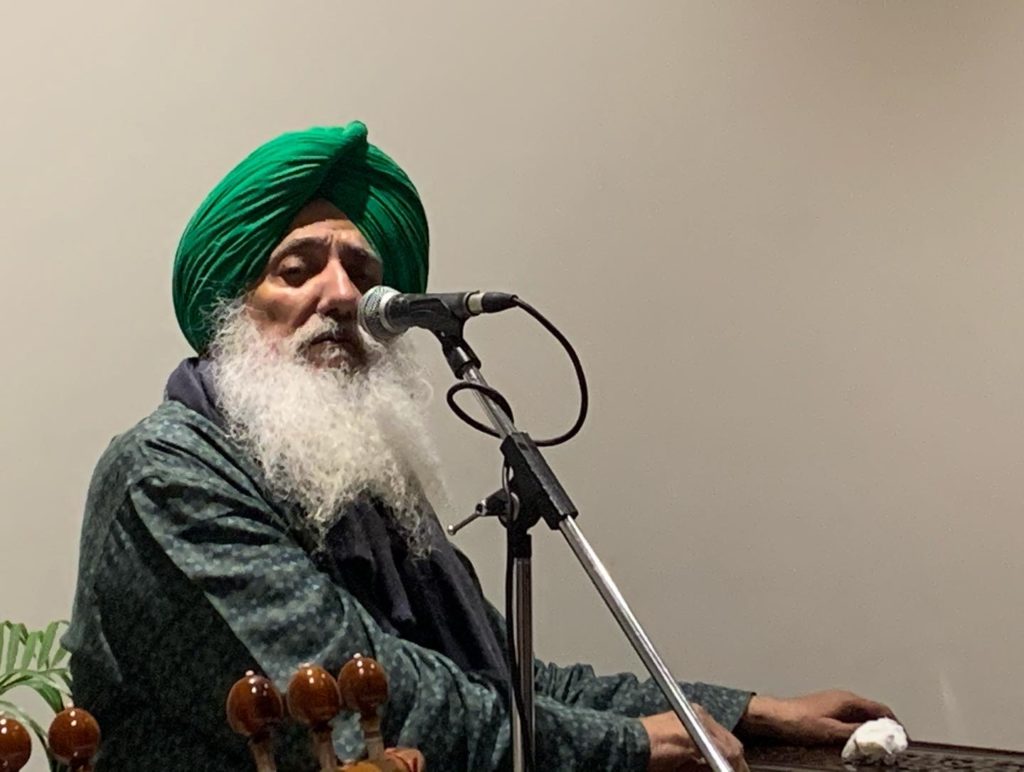
dr. madan gopal singh
Dr Madan Gopal Singh retired from a Delhi University after teaching English literature for 42 years. He has since been travelling all over the world giving music performances and conducting workshops in various universities and colleges.
Dr Singh holds postgraduate degrees in English Literature and Linguistics from the University of Delhi and Jawaharlal Nehru University respectively. Additionally, he has India’s first Ph.D on cinema undertaking a semiotic study of some the seminal film texts from the thirties and the sixties.
Among the institutions and universities where he has conducted workshops and has lectured are Chicago University on the sacred music of North India, Hofstra University on the hermeneutics of the sacred word, Framingham University on music (all from US), University of British Columbia on Heer Ranjha, Simon Fraser University on the ways of resisting (both from Canada), School of Oriental and African Studies, London University (UK), on cinema, sufism and cultural histories at CEPT (Ahmedabad), Adishakti (Pondicherry), on cinema at NID (Ahmedabad), St Xavier College (Mumbai), on Indian aesthetics and the cinema of Mani Kaul at Visva Bharati (Shanti Niketan, Bolpur), World Literature Centre, Dhaka on Tarkovsky’s cinema, a series of open workshops and lectures at the Smithsonian Institute on the Secular Ethos of the Sacred with reference to the cultural exchange during the days of Silk Route. There are many other universities, schools and colleges where he has initiated cultural dialogues around the themes of histories and memories.
He has performed extensively as a singer in some of the most prestigious festivals of the world including the Festival of India at Brussels, the Alchemy Festival / Jahan-e-Khusrau Festival at the Southbank Centre, London, Smithsonian Silk \ Route Folk Festival, Washington, World Sufi Spirit Festival, Lahore, World Sacred Spirit Festival, Jodhpur, World Music Festival, Trondheim, Norway, World Book Fair, Frankfurt, Theatre Biennale, Bonn, Evento, Bordeaux, Parramatta Southasian Festival, Parramatta, Sydney, Another Passage to India, Geneva, Dialog 2004, Barcelona, Sound Res, San Cesario, Torcito, Bari and so on.
He has composed music for the celebrated Pakistani film, Khamosh Pani and, last year, to the Irrfan Khan starrer Song of the Scorpion. Among the films scripted by him are Rasayatra (on the life of Pt Mallikarjun Mansur), Name of a River (on the life of the iconic Bengali filmmaker, Ritwik Ghatak) and did dialogues and lyrics of Kayataran, Qissa, Khamosh Pani and Song of the Scorpion.
Dr singh was visitor’s nominee to the International Mahatma Gandhi Hindi University, Vardha.
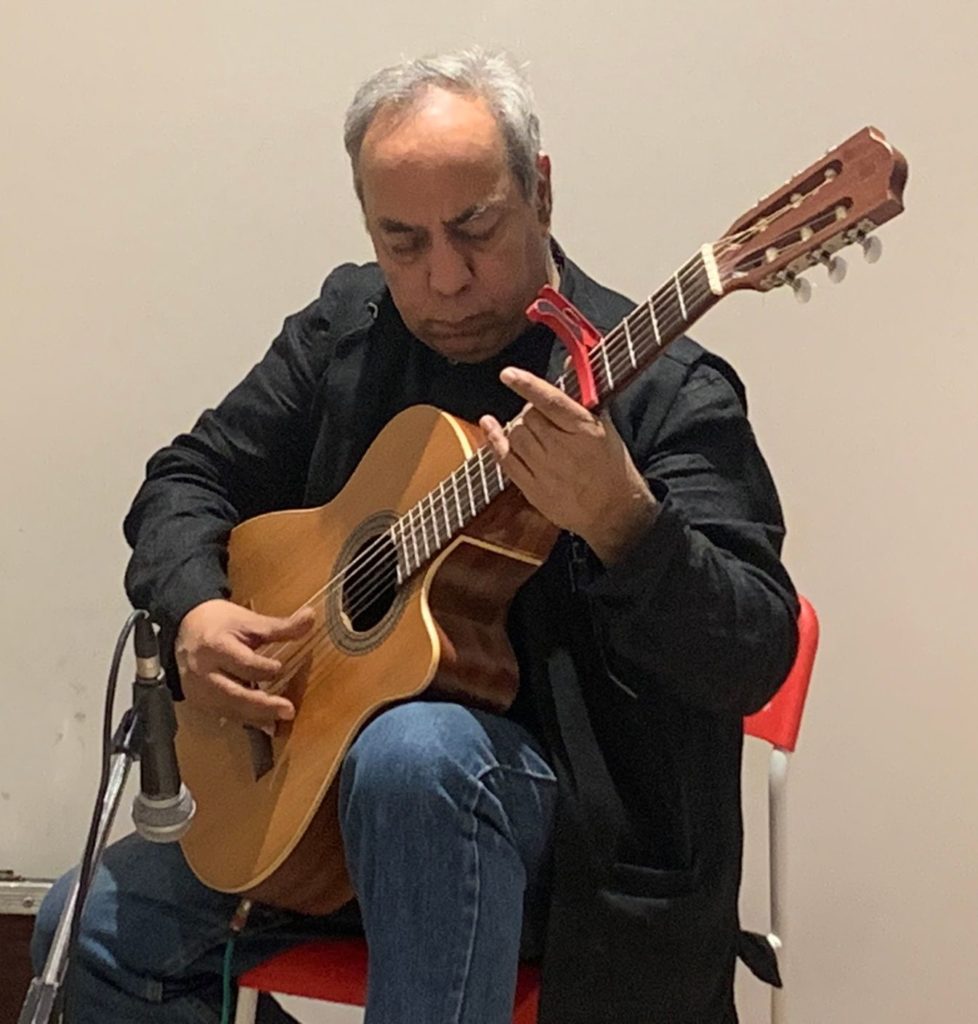
deepak castelino
https://oneworldmusic.in/teacher-profile/deepak-castelino.html
Deepak Castelino is an accomplished guitarist and banjo player who has been performing on stage for over thirty-five years. Essentially trained in the western tradition, Deepak has scored, and recorded music for English and Hindi films (“Electric Moon,” “In Which Annie gives It Those Ones,””Khamosh Paani,””Milk and Opium,””I Am Kalaam”), theatre and television commercials.
Deepak has participated in international music residencies and performed on stage for over 25 years with renowned Sufi music exponent and academician Dr. Madan Gopal Singh in Pakistan (2001 and 2006), Switzerland (2004), Italy (2005), Germany (2006), Belgium (2006), Nepal (2010 and 2013), United Kingdom (2011, 2016 and 2017), France and Australia (2011), United States (2014 and 2017), Canada (2014 and 2017) and Muscat (2015).
Deepak’s versatile repertoire includes traditional English and Hindi folk music, jazz, and popular western music. He is one of Delhi’s best-known live music entertainers and performs extensively at private and corporate parties, and also for social causes. In addition, Deepak teaches students, young and old, to play the guitar. He conducts guitar workshops regularly at prominent cultural venues, institutions & schools across the country for students, educators, and enthusiasts.
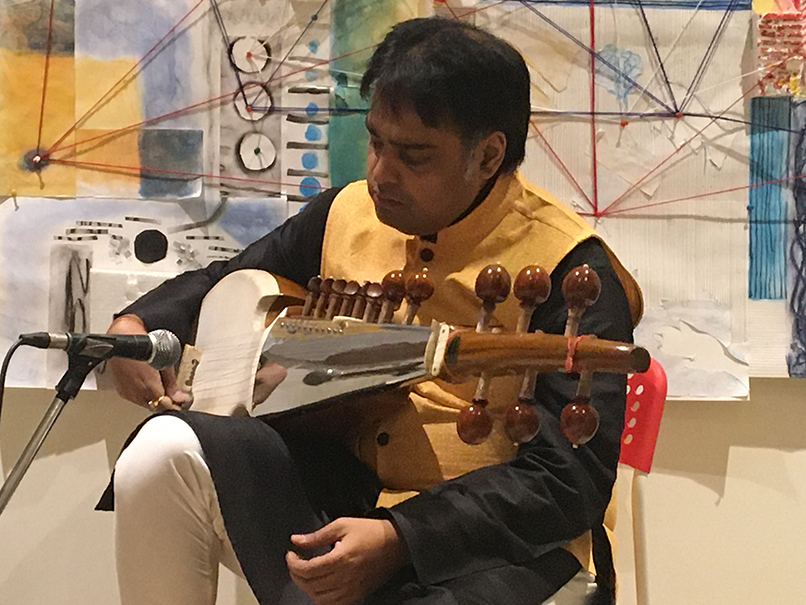
preetam ghoshal
https://in.linkedin.com/in/pritam-ghosal-1a4b6710
Pritam ji was born into a musical family – grandfather Late Shri Jaharlal Ghoshal was a well-known singer & percussionist, father Shri Arun Kumar Ghoshal is a violinist and uncles – Shri Barun Kumar Ghoshal and Shri Arup Kumar Ghoshal – are each a percussionist & a vocalist, respectively.
Pritam’s first lesson in vocal music was at the age of 14 from his father. He was introduced to the sarod by Shri Pranab Naha, disciple of the great sarod maestro Pandit Radhika Mohan Moitra. In 1995 he received the blessings of from the legendary sarod maestro Ustad Amjad Ali Khan and has since been his disciple.
Pritam is a Sarod Player full of energy and modern approach towards his music. His purity of notes, resonant strokes and clarity are the key to his soulful Sarod which transports the audience to sublime dimensions.
Along with great talent, Pritam ji also carries kindness and a disarming fondness for food.
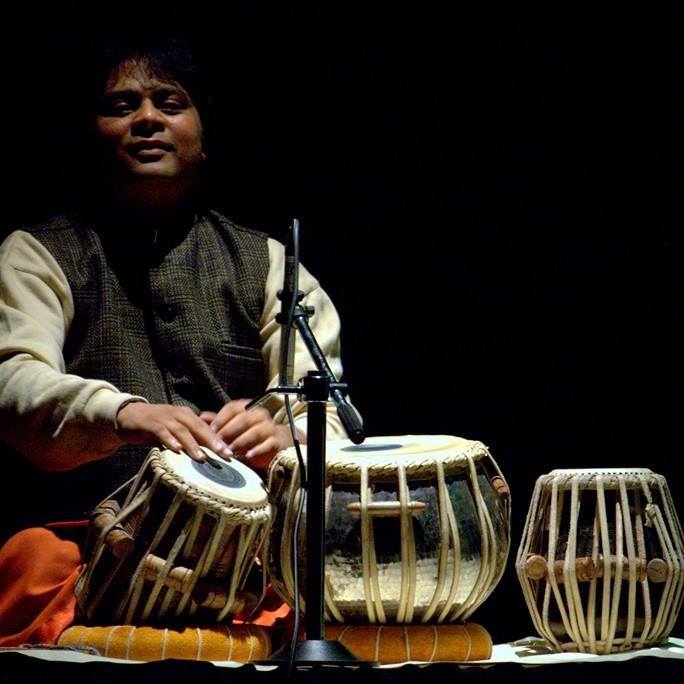
ustad amjad khan
Amjad ji was trained under the supervision of great tabla maestro – Ustad Manju Khan Sahib,Ustad Nazir Baba,Ustad (Agrada Gharana) Late Ustad Naimuddin Khan and Late Ustad Naimuddin Khan Sahib (Delhi Gharana). He started his musical journey with the prime guidance of his uncle, tabla virtuoso Late Ustad Latif Ahmed Saheb.
Amjad ji has accompanied many leading exponents of music of India as well as Pakistan like Pt. Ajoy Chakroborti, Ustad Ghulam Ali Khan, Mehdi Hasan, Nusrat Fateh Ali, Farida Khanam, Ustad Salamat Ali Khan, Shafqat Ali, Ahmed Hussian & Md Hussian, Pt . Debu Chowdhury, Pt. Vishwa Mohan Bhatt Reshma Ji and, Hari Haran,.
Amjad ji’s graceful style and intricate technique offer rich tones and rhythms; gliding through rapid passages with ease while maintaining the beauty & integrity of compositions.
Amjad ji is an A Grade artist from ALL INDIA RADIO, Ministry of I&B,INDIA

 malkum
malkum